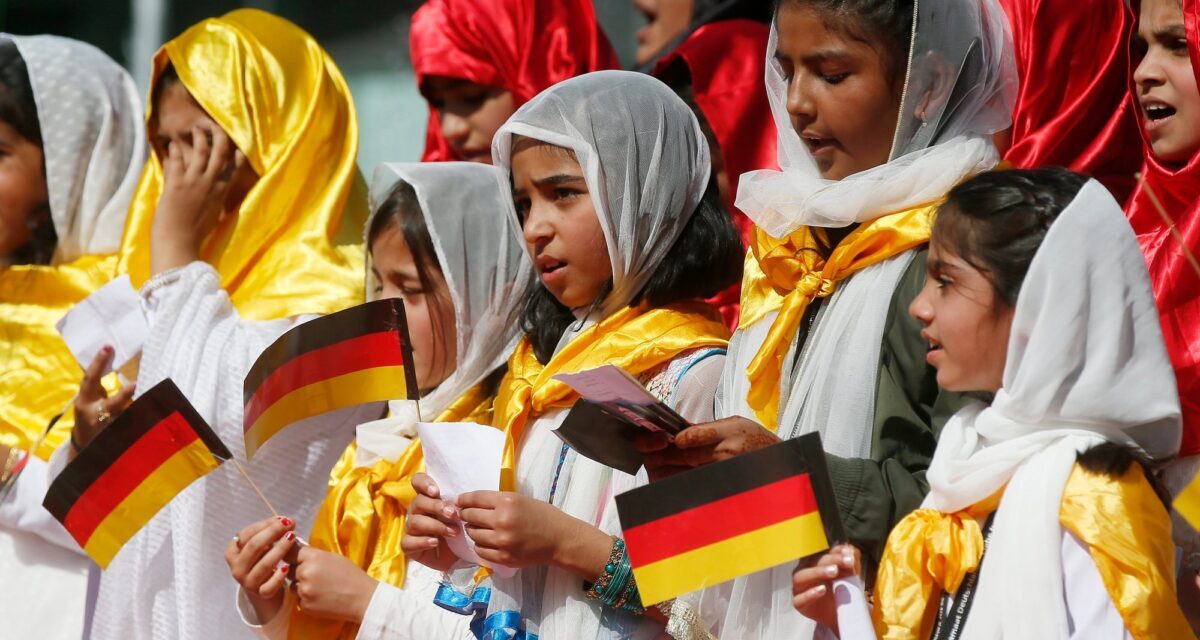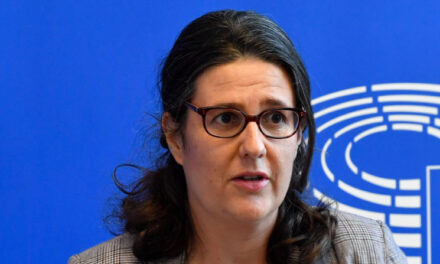The Deutscher Landkreistag (DLT) is a German umbrella organization of 294 administrative districts, which represents three quarters of local governments, about 96 percent of the country's territory, and - with 57 million people - 68 percent of Germany's population. According to the proposal prepared by them and unknown to the government, Germany must change its migration policy. This is proven, among other things, by the Solingen attack.
Nearly 2.8 million asylum applications were submitted in Germany in the last ten years. In addition, around 1.2 million Ukrainian refugees have been accepted into the country since 2022 (this is more than a quarter of the people who fled Ukraine to Europe). The capacity of local governments to receive and integrate refugees is thus exhausted. Strict restrictions on illegal migration are urgently needed. In light of this, the Deutscher Landkreistag welcomes the security package presented by the German government on August 29, 2024, which also calls for the tightening of detention and asylum laws. However, the Deutscher Landkreistag believes that, in addition to the consistent implementation of existing legislation, such a comprehensive concept should include the following points:
1. Adjustment of the foundations of refugee law: abolition of supplementary protection status; providing protection in neighboring countries
The legal basis for protection in Germany and Europe needs to be reviewed to see if it still meets the current challenges. This applies in particular to regulations that extend the protection against individual (political) persecution – the historical core of refugee law – to refugees fleeing war and civil war. At the European level, this applies in particular to the status of subsidiary protection.
About a quarter of asylum seekers recognized in Germany receive this status; this is especially true for refugees from Syria. In the opinion of the Deutscher Landkreistag, this instrument proved to be inadequate. Since the subsidiary protection status is defined by binding international law only rudimentarily, the member states of the European Union can completely abolish it. If this fails, it must be fundamentally reformed and its structure must be more clearly distinguished from recognized refugee status.
The Deutscher Landkreistag calls for those civil war refugees who are not threatened by individual (political) persecution to be offered protection in neighboring countries of the affected country, with the support of the European Union. This would save those affected from having to flee to Europe, which is often dangerous, and allow them to return to their home country as soon as the situation there calms down. Furthermore, it can be assumed that integration into the host society in neighboring countries is significantly less challenging than in the member states of the European Union.
2. Significantly increase the number of returns and deportations - Deportations should also take place to Syria and Afghanistan
There are currently 227,000 people living in Germany who have to leave the country. 44,000 of them do not have a tolerated residence permit, so they could be deported immediately. In light of this, the remaining obstacles to deportation must be removed quickly. If necessary, the legal instruments must also be tightened accordingly.
Deportations often fail because the identity of the person concerned cannot be established. In the future, it must be ensured that clarifying one's identity is already a prerequisite for submitting an application for asylum. Accordingly, European and national law must make it clear that the asylum application of persons whose identity cannot be established with certainty based on identity documents or similar documents can be rejected.
Furthermore, it must be ensured that the Federal Office for Migration and Asylum ( Bundesamt für Migration und Flüchtlinge – BAMF) reacts immediately to the improvement of the security situation in the countries of origin (by withdrawing recognition if necessary). In this regard, the recent judgment of the Münster OVG deserves special attention. The court ruled that there is no longer a serious, individual threat to the life or physical integrity of the civilian population in Syria. Three years after the Taliban took power, the situation in Afghanistan is relatively stable, as evidenced not least by the many documented "returns" of Afghan asylum seekers. In order to prevent people who are to be deported from escaping, they may need to be detained pending deportation. In this regard, the legal basis has already been tightened recently with the law on the improvement of repatriation.
It is now mandatory to provide the necessary number of detention places for this purpose, based on DTL's proposal in accordance with Dublin III. pursuant to the regulation, in many cases, Germany is not responsible for assessing the asylum applications of asylum seekers who previously resided in other member states of the European Union. According to their point of view, the functioning of the Dublin system is currently no longer ensured, primarily because individual countries have unilaterally terminated cooperation, and are refusing or delaying the approval of legitimate admission requests (e.g. Greece and Italy). This is unacceptable for them, which is why they think that the functionality of the system would be significantly increased if the Dublin cases were expelled at the German borders. And if this is currently not possible according to EU law, then the relevant regulations must be amended immediately.
3. Continuation of border controls
Consistent border control is a prerequisite for rejecting Dublin cases. Consistent border controls have "impressively demonstrated their effectiveness as a means of controlling and limiting illegal migration [...] and should therefore be extended and expanded".
4. Reduction of benefits for persons seeking protection - reduction of attractive factors
The high level of social benefits provided in the country makes Germany particularly attractive as a destination country for refugees and contributes to the uneven distribution of refugees within the European Union. SS § 1. (4) paragraph 1a of the Act on the benefits of asylum seekers. the already existing entitlement restrictions according to point 2 show that properly justified reductions are possible in principle - within the framework of the strict jurisprudence of the Federal Constitutional Court. Therefore, the federal government's proposal to largely exclude the use of social benefits in Germany in certain Dublin cases is also to be welcomed.
According to them, this proposal should be extended to all asylum seekers for whose application another EU member state is responsible, as well as to other persons obliged to leave without tolerance. They should only be provided benefits in the form of accommodation and care in central deportation facilities. All of this would create a significant incentive to leave Germany voluntarily and could significantly increase the effectiveness of voluntary return programs.
The benefits of rejected asylum seekers, who are legally staying in Germany only on the basis of a tolerated stay, should also be reduced to the level of basic benefits. This can encourage those concerned to leave the country voluntarily, and increase their willingness to help remove obstacles to deportation. The harmonization of integration and social benefits at the European level - that is, that the social standards of individual member states must be equivalent - can also contribute to making Germany less attractive as a destination country, thereby supporting a more even distribution of refugees in Europe.
5. Termination of voluntary admission programs - suspension of family reunification
The Deutscher Landkreistag reiterates its previous call for the immediate cessation of voluntary refugee reception programs. The reason for this is that until illegal migration can be effectively limited, there is no room for voluntary acceptance of additional refugees.
In addition, as far as this is legally possible, family reunification must also be suspended. EU law opens up opportunities for national legislators to do so, especially in the case of persons entitled to supplementary protection. Accordingly, in 2016, Germany first completely suspended family reunification with those entitled to supplementary protection for two years, and then limited it from 2018. Since then, family reunification has been subject to a limit of 1,000 persons per month ( S 36a AufenthG ). In view of the current situation, family reunification with those entitled to supplementary protection must be completely suspended again.
6. Rapid implementation and further development of the reform of the Common European Asylum System
After several years of discussions about the Common European Asylum System (CEAS), the European legislator officially adopted the new asylum and migration package in the spring of 2024. The changes are in line with the long-standing demands of the Deutscher Landkreistag and must be implemented as quickly as possible. However, expedited procedures in border transit centers should be extended to all groups of refugees. In addition, it should be made clear in EU law that in the future those seeking protection will only be entitled to an asylum procedure in Europe.
7. Temporary national admission ban as a last resort
Both the national fundamental right to asylum and international refugee law are covered by the urgency clause. Accordingly, no state is obliged to accept refugees to an extent that involves an acute threat to the functioning of its institutions. Signs of such acute danger include administrative overload (for example in the execution of asylum procedures), exhaustion of reception capacities or lack of linguistic or social integration opportunities.
In many respects, these limits have already been reached and even exceeded. This is supported by the long duration of asylum court proceedings; the fact that asylum seekers can only be accommodated in emergency accommodation in many places; long waiting times for integration courses, as well as the unsustainable situation prevailing in kindergartens and schools, where the high proportion of foreigners threatens the success of German youth. That is why, if the measures listed above do not lead to a significant reduction in illegal migration in the near future, the Deutscher Landkreistag considers it justified to significantly limit the number of admitted refugees or to temporarily suspend admission.
In doing so, EUMS no. Article 72, which states that the migration law requirements of EU law do not affect the exercise of the Member States' duties regarding the maintenance of public order and the protection of internal security. This is especially true at a time when doubts arise regarding the sustainability of pan-European solidarity due to the deliberate omissions of individual member states, and when the unrestricted influx of illegal migrants for years suggests the failure of the common European asylum system. That is why it cannot be ruled out in any way that a particularly adversely affected member state (for example, Germany) takes unilateral measures to limit admission, invoking the provisions of Article 72 of the TFEU.
8. Mandatory involvement of local authority umbrella organizations
Finally, the DTL emphasizes, the municipalities, which are largely responsible for accommodation, care and integration, must be urgently and timely involved in further negotiations between the federal government, the parliamentary opposition and the federal states through their umbrella organizations.
Author: Jr. Zoltán Lomnici / alaptorvenyblog.hu
Cover photo:
Children participating in the German Muslim Peace Conference wave German flags in Karlsruhe on September 7, 2018. The conference with the motto "Love for everyone, hate for no one" was organized by one of the largest Islamic communities in Germany, the Ahmadiyya, which has more than 45,000 active members and operates more than 50 mosques. (MTI/EPA/Ronald Wittek)













